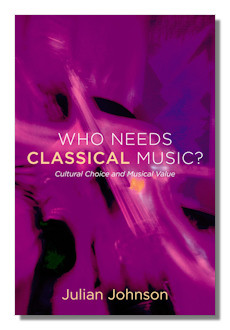
The Internet's Premier Classical Music Source
Related Links
-
Introduction
Acoustics
Ballet
Biographies
Chamber Music
Composers & Composition
Conducting
Criticism & Commentary
Discographies & CD Guides
Fiction
History
Humor
Illustrations & Photos
Instrumental
Lieder
Music Appreciation
Music Education
Music Industry
Music and the Mind
Opera
Orchestration
Reference Works
Scores
Thematic Indices
Theory & Analysis
Vocal Technique
Search Amazon
Recommended Links
Site News
 Book Review
Book Review
Who Needs Classical Music?

Cultural Choice and Musical Value
Julian Johnson
Oxford University Press, 2011. xv, 140 pages
Paperback edition with new Introduction
ISBN13: 9780199755424
ISBN10: 0199755426
Ranging from philosophical aesthetics to quasi-polemic, Johnson's main concern in this essay, first published in 2002, is the position taken by professors of Cultural Studies and others who consider a preference for classical music as just a taste for some among many musics and who, not stopping with that, tend to label a taste for classical music with the abusive label "elitist." A corollary of that view is that classical music is no more deserving of public financial support than other musics. In the course of discussing these views, Johnson deals in part with the sociology of mass culture and marketing aspects of music in general.
Rather than entering into futile discussion of taste as such, Johnson wisely chooses to discuss classical music as art, which he is prepared to distinguish from entertainment. His strongest arguments are that works of art require focus on the work itself rather than simply on one's reaction to it, thus ensuring a measure of objectivity. He notes, all too briefly, how musical and other works of art are made as part of a process that may be painstaking. This process involves rejection, along the way, of alternatives less innovative, less surprising, and generally less satisfying than the finished work, which finally becomes an achievement that can sustain lasting interest. In contrast, music of any sort used as "elevator music" or even as dance music where one's attention is not fully on the music, does not result in an experience of art, which requires a complete surrendering to the work, he claims.
When he goes beyond this, Johnson's discussion becomes less convincing, Some readers, even those sympathetic to Johnson's aims, as I am, may even find him condescending, notably when he takes up the fact of technological reproduction of music. CDs are objects, yes, but Johnson makes the presumptuous assumption that they will be used in ways unworthy of the music they may contain as, for instance, when a listener pauses the music to take a telephone call.
Towards the end of the book, Johnson makes ethical and transcendental claims about art that many readers will find both unpersuasive and unnecessary. Classical music as such nearly drops out of the picture altogether, weakening rather than strengthening Johnson's overall argument. Speaking for myself, I was delighted initially to find Johnson taking up questions that long interested me intensely, but I could not relate to some of his discussion of mass culture and the extremely abstract arguments of the last chapters.
Johnson's prose is readable, avoiding technical jargon and musical examples. At times Johnson seems to sermonize but he is always provocative and the book sustains interest. As Johnson notes, these theoretical concerns are barely discussed these days. The fact that he revives the discussion is enough to make the book well worth reading.
Copyright © 2011, R. James Tobin



















